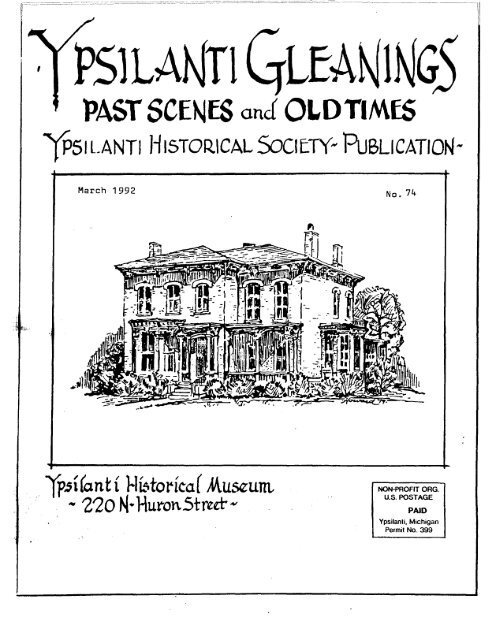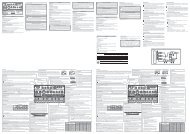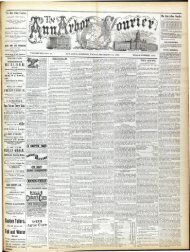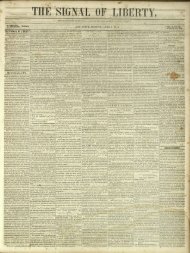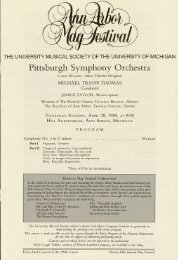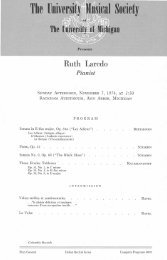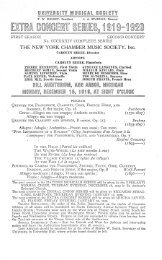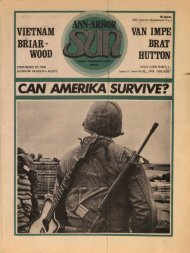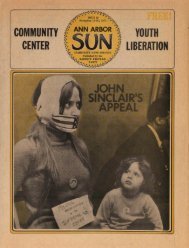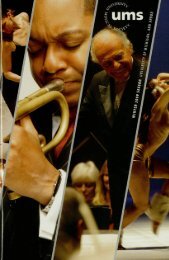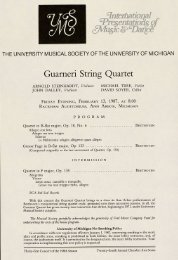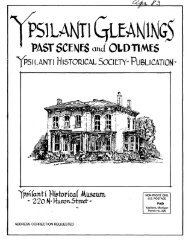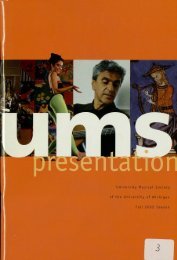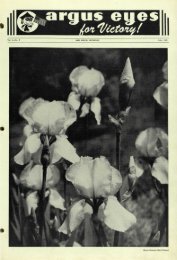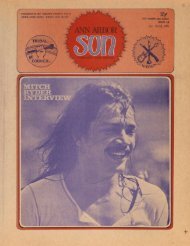ypsilanti historical society- publication - Ann Arbor District Library
ypsilanti historical society- publication - Ann Arbor District Library
ypsilanti historical society- publication - Ann Arbor District Library
You also want an ePaper? Increase the reach of your titles
YUMPU automatically turns print PDFs into web optimized ePapers that Google loves.
"YPSILANTI HISTORICAL SOCIETY- PUBLICATION-<br />
March 1992 N o < 74<br />
plianti HfetonW Museum<br />
* 220 N*Huron5tredr~<br />
NON-PROFIT ORG.<br />
U.S. POSTAGE<br />
PAID<br />
YPSILANTI, MICHIGAN<br />
PERMIT NO. 399
No. 74 March 1992<br />
President's Letter Page 1<br />
Brief History of Ypsilanti from Colburn's<br />
Book<br />
Page 2<br />
Lambie Diary 1897 Page CO<br />
Please be Seated Page 14<br />
Acquistions Page ' 15<br />
ARchives Musings Page 16<br />
Contributors: Doris Milliman, City Historian<br />
Billie Zolkosky, Archvist & Secretary of Society<br />
Cover Designs and Table of Contents designed by<br />
Arthur 0. Howard<br />
Contents of "Gleanings" may be reproduced if request is<br />
made and consent given.<br />
Office of Ypsilanti Historical Society is at 220 N. Huron Street<br />
Ypsilanti, Michigan 48197<br />
The Museum at 220 N. Huron Street, Ypsilanti, Michigan is owned<br />
by the people of the City of Ypsilanti and operated in the public<br />
interest by the Ypsilanti Historical Society, a non-profit group<br />
of public spirited volunteers.
OUR MEMORIES OF:<br />
M. Ethel O'Connor<br />
1 899 - 1 991<br />
M. Ethel O'Connor's devotion and commitment to the<br />
Ypsilanti Historical Museum will long be remembered<br />
by those who knew her. Having been a teacher, she<br />
was especially adept at telling groups of children<br />
about the Museum. 5he made it a real learning<br />
process for the listeners. It was Ethel who established<br />
the schedule for Museum guides that is still<br />
used. She served for fifteen years on the Administrative<br />
Committee where she was a very active<br />
member.<br />
"None knew her but to love her-None named her but<br />
for praise"<br />
Oohn Burton<br />
191 0 - 1992<br />
Oohn Burton served as Mayor of Ypsilanti from 1967<br />
to 1968 and it was during his regime that the city<br />
gave the Historical Society the use of the brick<br />
house at 220 North Huron Street. Much remodeling<br />
was done to the house before the Museum Artifacts<br />
were moved from the basement of the Ypsilanti<br />
Public <strong>Library</strong> to the house where the Museum now is.<br />
The Historical Society has always been indebted to<br />
Oohn Burton and the city for the use of the house<br />
at 220 North Huron Street.<br />
Dorothy (Dottie) Disbrow<br />
1920 - 1992<br />
Dottie served as City Archivist from 1965 to 1980<br />
and during that time she did much research in local<br />
history which was published in the Gleanings. The<br />
material she wrote is an invaluable resource in the<br />
Archives and will serve as a Memorial to her for<br />
many years. Among the articles she wrote is one on<br />
the History of the Archives, Historical Society and<br />
Museum: another was about Lowell, the ancient City<br />
and a series of articles on Ypsilanti, its past,<br />
present and future.<br />
Doris Milliman<br />
City Historian
Board of Directors<br />
Ypsilanti Historical Society<br />
220 North Huron St.<br />
Ypsilanti MI 48197<br />
Dear Board Members:<br />
T H E UNIVERSITY O F MICHIGAN<br />
MUSEUM OF ANTHROPOLOGY<br />
UNIVERSITY MUSEUMS BUILDING<br />
ANN ARBOR, MICHIGAN, U.S.A. 48109-1079<br />
26 February 1992<br />
This letter is in regards to the development of educational displays by Mr. and<br />
Mrs. Frank Freeman with the archaeological collection of the Ypsilanti Historical<br />
Society. I have worked with the staff and volunteers of 10 <strong>historical</strong> societies<br />
and I have never seen anyone equal the hard work and dedication of the Freemans<br />
in the undertaking such a large project. The Freemans have diligently attended<br />
five public workshops at the University of Michigan Museum of Anthropology to<br />
prepare these informative and scientifically accurate displays. You are very<br />
fortunate to have such people taking an active role in maintaining your museum.<br />
You are also very fortunate to have such an important archaeological collection<br />
in your possession. Your new displays represent many important concepts relating<br />
to the prehistoric and early historic people of Michigan. Prehistoric people<br />
account for 97% of the time humans have lived in this area, yet it is rare to see<br />
quality, educational displays that depict the diversity and lifestyles of these<br />
cultures. These artifacts are scientifically significant because we know were<br />
they were collected. This material represents one of the best collections of<br />
Washtenaw County artifacts that I have seen. The artifacts from Virginia and<br />
Kansas are interesting because one can make comparative studies between these<br />
three culturally distinct areas. So often I hear about such collections after<br />
they have been sold to a number of private individuals and thus are no longer<br />
available for study. It is important that such collections remain in museums for<br />
the benefit of all future generations.<br />
I am most appreciative of your loaning several Paleoindian pieces from this<br />
collection for detailed study and drawing.- These artifacts were made by some of<br />
the first human residents of Michigan and are significant to studies conducted<br />
by myself and Dr. Henry Wright, the Director of the University of Michigan Museum<br />
of Anthropology. These artifacts will be included in a monograph by Dr. Wright<br />
on the Paleoindians of Michigan that will be prepared during the next two years.<br />
I am beginning the research for an article on a large Paleoindian site in Lucas<br />
County, Ohio. One of the points that I have borrowed is identical to the<br />
specimens from the Ohio site and will be included in my study. Your <strong>society</strong> will<br />
be acknowledged in those <strong>publication</strong>s for assisting these studies.<br />
If I can ever be of assistance to your <strong>society</strong>, please feel free to contact me.<br />
Sincerely,<br />
James H. Payne<br />
Research Assistant<br />
Great Lakes Range
Y P S I L<br />
«« gJgTRfPBBV<br />
Expenses disbursed frorn Bank One Accout:<br />
Building Expense<br />
•ffice Expense<br />
Administration Committee<br />
Gift Shop Purchases<br />
Miscellaneous Expense<br />
Calendar Expense<br />
Yearly Income<br />
Dues Collected<br />
Gift Shop Sales<br />
Administration Committee<br />
Donations<br />
Donations from Box<br />
Yard Sale<br />
Interest from CD'S<br />
Archives<br />
Profit from Calendars Sold<br />
Transferred from Savings<br />
Bank Balance 1/1/92<br />
•Includes $4,600.00 for Atlas. (200)<br />
S D C I E T Y<br />
$ 3,429.69<br />
4,518.35<br />
840.••<br />
7,074.DD<br />
1,265.00<br />
3,680.00<br />
$20,807.04<br />
$ 1,763.00<br />
2,696.42<br />
5,250.00<br />
B11 .35<br />
25B.53<br />
737.70<br />
3,572.26<br />
363.90<br />
1 ,360.00<br />
$16,81 3.1 6<br />
3,000.00<br />
$19,813.16<br />
2,394.35<br />
$22,207.51<br />
**Amount reimbursed from Calendar Advertisers<br />
Gift Shop Inventory $3,000.00 +$4 , 600. OO^A.tlas ' s<br />
William F. Ealy, Treasurer<br />
Ypsilanti Historical Society
Letter from your President:<br />
Dear Members and Friends of the Ypsilanti Historical Society:<br />
The Valentine Tea at the Museum was a large success, and I feel the<br />
displays uas very uell handled. The exhibition of these beautiful<br />
valentines, on loan from Grace Cornish, Lamar Gress and others that<br />
had been donated by Ellen Gould uas greatly appreciated by all.<br />
Also enjoyed uas the piano background music by Eva Kelley on our<br />
tuo pianos- the Steinuay in the Parlor and the Mehlin in the Uhite<br />
Room. Hosts and Hostesses uere Board members.<br />
Our Arrouhead and artifacts collection has been nearly completed<br />
in regards to identifying and cataloging, and it has been put into<br />
a presentable form for display. Some of the artifacts have been<br />
restored to their original Indian use form, mainly knives and scrapers.<br />
A feu items have not yet been returned, as the presentation graphics<br />
have not yet been completed. The display has been excellently done<br />
by Mr. Frank Freeman. A feu item's are still out for evaluation as<br />
it is not of the same period or locality of most of the other items.<br />
Our Indian Village needs some uork done on it. It is a table top<br />
type, and some of the things need some R & R(repair and restoration).<br />
Our present rotating exhibit is of Girl Scouting, uith displays of<br />
uniforms, badges, etc.<br />
The next display uill be Easter Decorations of the past. Volunteer<br />
helpers should contact Mrs. Grace Cornish.<br />
Another item is to be our <strong>Ann</strong>ual Spring Cleanup of the grounds on<br />
Saturday, March 28. (Rain Day April 4) There uill be some inside<br />
as uell as outside uork. Ue need laun uork and shrub trimming, for<br />
instance.<br />
For our quarterly meeting the speaker uas Mrs. Carolyn Griffin, an<br />
English teacher at Ypsilanti High School, uho spoke on Geneology.<br />
She presented information on gathering material and organizing it<br />
onto usable forms. The program uas uell attended.<br />
See you at Spring cleanup.<br />
James Porter, President<br />
Ypsilanti Historical Society
The History of Ypsilanti<br />
A brief summary from the Colburn's History<br />
Long ago our city uas a forest. A beautiful river wound among the trees,<br />
inviting the deer, wolves and small animals to drink the clean water.<br />
The only sounds were the songs of the birds, the rustle and suaying of<br />
the uind bloun trees, and the speech of the animals.<br />
There came a day uhen Indians began camping on the river bank. They<br />
were ualking to a clearing called Detroit. Here they could trade furs<br />
for beads and other things they had never seen before.<br />
The Indian tribe called the Hurons, made their homes, from time to time,<br />
along the river bank. They uere Iroquois uho had been driven from Canada.<br />
The Potauatomi tribe uere Algonquins and since they uere friendly uith<br />
the Huron, they camped nearby. A trail called the Potauatomi Trail<br />
reached to Detroit from the place uhere the Michigan Avenue bridge is<br />
today.<br />
The Indians used only things they found in the woods to help with their<br />
survival. Their clothing uas made from skins and furs. Tools and dishes<br />
were made from uood, stone, and bone. They uere very good carpenters and,<br />
uith their stone hatchets, made huts, boats, paddles, bous, arrows, bark<br />
basketsjbowls and traps. They built lodges by bending young trees together<br />
and covering them with bark. Fires were built in the center and<br />
the smoke escaped through a hole .at the top.<br />
Food was uncertain since they depended upon hunting and fishing and had<br />
only crude uays to be successful. The men did the hunting but uomen and<br />
children uere kept busy gathering berries, and digging up uild roots. Later<br />
the uomen learned that seeds could be planted and corn uould grou and could<br />
be used for food. Crude tools for planting and harvesting uere left and<br />
found later in the earth on the south side of the river near uhere our<br />
city is nou. This proves that an Indian camp became a village uhere they<br />
stayed for some time.<br />
In 1809 it uas a great distance to ualk single file to Detroit so the<br />
Indians uere pleased uhen a Frenchman named Godfroy built a trading post<br />
on the river bank. Indians brought their furs here to trade and the<br />
Godfreys sent them across the ocean. One day the trading post burned<br />
to the ground.<br />
In 1820 the second post uas built. This one uas also destroyed by fire<br />
but not before the Godfreys and tuo other Frenchmen had bought 2000 acres<br />
of land uest of our river. The Indians could not understand about land<br />
ounership and uere surprised uhen they uere asked to move. They had<br />
believed that they uould continue to live as usual and share the land<br />
uith the neu owners.<br />
In 1823, one spring day some men from Ohio came up the river on flat boats.<br />
They uere looking for a place to build neu homes. These men uere brave<br />
men uho uere uilling to live in a uilderness uithout even a path in order<br />
to make a clearing and build a log house they could call their oun.<br />
2.
Many hugh houses mere built near the college site. They added elegance<br />
to the area.<br />
A setback occured in 1851. A fire broke out and most of the business<br />
places on Michigan Avenue burned. They were soon replaced by better<br />
buildings and an iron bridge took the place of the old wooden one across<br />
the river. All of this prompted the first fire engine called the Tea<br />
Kettle. Fireman pumped the water from cisterns behind each house.<br />
By 1858 there were newspapers and people were traveling from north to<br />
south by train. The states in the north learned what was happening in<br />
the south. The news stated that black people were called slaves because<br />
they were owned by the people for whom they worked. If these slaves<br />
could run away and get into Canada they were free. Some people in<br />
Ypsilanti sympathized with them and helped to free them.<br />
Many came to Ypsilanti in the night and were hidden and fed until they<br />
could be taken further under cover of darkness.<br />
One man took them to the river in a covered wagon with two floors. The<br />
top floor was stacked with boxes of cigars which he made for sale, but<br />
between the two floors lay the people seeking freedom. Uhen they got<br />
to the Detroit River a boat would be waiting to take them to Canada<br />
In 1861 the states in the south decided to leave the Union. President<br />
Lincoln called for help to keep the United States together and the men<br />
from Ypsilanti were some of the first in the state to offer themselves<br />
for service. Uhen this Civil War ended the black men were free and<br />
many came to Ypsilanti because the city was anti-slavery.<br />
The East side of the town was unhappy with the West side and decided<br />
to leave the town and form one of its own. After many meetings the two<br />
sides decided that they needed each other so they united and found that<br />
together they could form a city. They elected Mr. Chauncey Ooslin the<br />
first mayor.<br />
The city bloomed like a garden during the next twenty years. The first<br />
Prospect School was built and the cemetery was moved and a park took<br />
its place. The ladies club planted trees and bushes and added a pond.<br />
A cannon was sent from Maine.<br />
In 1893 a Business School called Cleary College brought many people<br />
to the city.<br />
The bicycle had made its appearance so people were meeting more. A<br />
streetcar called the Ypsi-<strong>Ann</strong> was pulled by horses between Ypsilanti and<br />
<strong>Ann</strong> <strong>Arbor</strong>.<br />
Electricity came in the next ten years andthe street-car used it instead<br />
of horses to make the wheels turn.<br />
The first electric light was on the porch of the mill on Cross Street.<br />
Beautiful gardens were planted at the depot and small bouquets were<br />
presented to the passengers on the train when it stopped in Ypsilanti.<br />
3.
A stone has been marked where Prospect Street and Grove Road meet to<br />
show us where Woodruff's Grove was located.<br />
The new road was built by cutting logs and placing them side by side<br />
across the trail. The thin logs were placed on high ground and thick<br />
ones went onthe low wet spots. It was called a corduroy road. A<br />
cart or wagon could be heard rattling ; over the logs for a mile coming<br />
or going.<br />
The new road had brought enough people to join the villagers, to form<br />
a town. There was a store, a mill, a small school house and a church.<br />
People began buying land for one dollar twenty-five cents an acre.<br />
Many homes were built. The materials were nicer and were replacing<br />
logs and bark. The Norris family built a large home on the east bank<br />
of the river. They drove the first two wheeled carriage in town. A<br />
stage coach began carrying people from town to town. Other settlements<br />
like Plymouth, and <strong>Ann</strong> <strong>Arbor</strong> and Dearbornville had sprung up.<br />
A name for the town was necessary. Judge Woodward from Detroit was asked<br />
for advice. The news from across the ocean told about a brave Greek<br />
General who won a battle for his country. His name was Demetrius<br />
Ypsilanti. The people decided to name the town for him so it has been<br />
called Ypsilanti to this day. A statue of the general may be seen where<br />
Cross street and Washtenaw Avenue meet.<br />
In 1 837 Michigan became large enough to be made a state and to get a<br />
star in the flag. Soon after Governor Mason visted Ypsilanti.<br />
The first steam engine was coming to town on the railroad track which<br />
had joined us to Detroit.<br />
Wood from the trees had played another important role. Very little iron<br />
was used in building the track but first blocks, stringers, ties, sills<br />
and wedges, all made from wood, formed the bed for the track. Wood would<br />
be used in the engine furnaces to make the steam to drive the wheels.<br />
Nearly all the people had gathered at the track to wait for the first<br />
iron horse ta come in. History tells us that the Governor walked into<br />
town because the engine broke down but surely the monster must have<br />
followed, snorting fire and smoke and breathing hard.<br />
There was very little talked about around Ypsilanti, except the "Cars".<br />
Everyone knew that a new era had begun for Ypsilanti and Michigan.<br />
A depot was built to receive the passengers from the train. This<br />
brought a hotel and some stores to the Cross Street area.<br />
The city cemetery was placed where Prospect Park is now. High School<br />
pupils were traveling from the outside and staying at school during the<br />
week. A hotel where the Cross Street High School now stands was made<br />
into a seminary for these pupils. The sleeping rooms were on the third<br />
floor.<br />
In 1849 Ypsilanti was chosed as a site for a State Normal 5chool. This<br />
was a great honor for the town. Teachers would be trained here. The<br />
students would come from all over the country and would need "rooming<br />
houses",<br />
4.
They found just the right place near our river. They began wearing out<br />
the axes they had brought with them. Neu sounds uere made in the stillness<br />
by the heavy blows of these axes as many trees were falling. The ground<br />
shook with the force of their fall and the birds and animals fled deeper<br />
into the forest.<br />
As soon as the homes were built the men went back to Ohio for their<br />
families, furniture and stock. One of the men was Mr. Woodruff.<br />
When the families, especially the wives were introduced to their log homes<br />
they were quite unhappy. They found the ground wet and swampy, the homes<br />
crude and cold and the forest lonely and scarey. They were also brave<br />
and unselfish and began thinking of making the best of their fortune.<br />
Detroit was the nearest postoffice. The settlement was named Woodruff's<br />
Grove.<br />
This same year(1 823) in the fall, Mr. John Bryan and his family came all<br />
the way from New York in an ox cart. The last four days of their journey<br />
was spent hacking a road through to this area. The BRyans stayed with<br />
the people in woodruffs Grove until they finished their log cabin in<br />
December. In February a baby boy was born to them. They called him<br />
Alpha Washtenaw which meant First in the County.<br />
The next spring these few families planted seeds they had brought with<br />
them and soon were enjoying potatoes, squash, beans, and corn from their<br />
gardens. The men rode their horses to Detroit and bought a few things<br />
like molasses and raisins, Mr. Woodruff would bring their mail home in<br />
his hat. Honey from the bees provided sweets, game from the forest and<br />
fish from the river furnished their meat. The next year 182-+ more people<br />
came and brought good seed, currant bushes, rose bushes and small apple<br />
trees.<br />
The Woodruffs were kind to the new neighbors who were tired and homesick.<br />
Mr. Woodruff decided that everyone who had survived the move to this part<br />
of Michigan should meet and celebrate. He planned a picnic for July<br />
Fourth, when Independence Day is celebrated.<br />
This time, he took the flat boat to Detroit and brought back barrels of<br />
food. The ladies cooked over fires in the yard.<br />
Thirty-eight people were living in Washtenaw County and they were all<br />
invited. It have been something like the first Thanksgiving.<br />
Ond day in Dune in 1825 an exciting thing happened. Some men came to<br />
measure land. They were trying to find the best place to make a road<br />
between Detroit and places west of it. Many people wanted to come to<br />
Michigan to build homes and the soldiers needed roads to protect the<br />
people.<br />
The surveyors knew about the old trail and they decided to build the<br />
new road over it.<br />
The people at Woodruffs Grove were very happy about the road but they<br />
were sorry it did not go through their village. Soon they joined<br />
the people who were planning a new village where the trail crossed the<br />
river.<br />
5.
In 1893 Ypsilanti had another set back. A cyclone either damaged or<br />
destroyed most of the business places. Luckily not one uas killed.<br />
The buildings had to be rebuilt and by 1900 the city looked much like<br />
it does today except for the horses and carriages that drove up and<br />
doun every street and were tied in front of the shops while the owners<br />
were inside.<br />
1900 brought the invention of the first automobile. Miss Woodward<br />
drove one of the first cars in Ypsilanti. It was a Covert Motorette.<br />
The horses snorted, reared, and ran out of control whenever they met<br />
one of the contraptions.<br />
The car demanded a change from rough roads. Cross street was the<br />
first paved street. Michigan Avenue was bricked so the dirt road was<br />
only on the side streets and in the country.<br />
By 1904 Ypsilanti had its first Beyer Hospital, a daily newspaper,<br />
126 street lights, 10 churches, 15 shops and 3 parks. 7587 people<br />
lived here and 993 students came to college. < v_<br />
In 1905 a three day reunion was held and 1000 people came back to visit.<br />
There were ballon ascensions, parties, band concerts and parades.<br />
The United States had entered a World War in 1914 but by 1920 it was over.<br />
An American Legion Post was formed in Ypsilanti. Its members were men<br />
who had fought in the war. Another Club called the Chamber of Commerce<br />
was working to make Ypsilanti a successful business place.<br />
These organizations united to furnish the best of parades and carnivals.<br />
People came from all over the state to see the American Legion Parade<br />
on the Fourth of July.<br />
Almost every family had some sort of an automobile and the horse and<br />
carriage was disappearing an the streets.<br />
The airplane had been invented and used during the war but one was<br />
seldom seen over Ypsilanti.<br />
The Normal was educating teachers from the entire country. A six weeks<br />
summer course plus a teacher's examination made a high school graduate<br />
into a teacher. A two year course made one a teacher for life. Since<br />
graduates wore a cap and gown, Ypsilanti adopted a Town and Gown<br />
slogan.<br />
Twenty years of peace then another world war in 1941 found us joining up.<br />
Airplanes were quite a common thing by this time and were used to do the<br />
greatest damage in battles because they dropped bombs on targets.<br />
A mammoth building and airfield were added just outside of Ypsilanti<br />
and bombers were built there.<br />
It seemed like the whole United States moved to Ypsilanti. The big houses<br />
were divided into apartments. A whole village called Willow Village was<br />
built near the Bomber Plant and homes were built in groups called subdivisions.<br />
6.
New Schools, churches, eating places and Business uere added to care<br />
for the new neighbors.<br />
lilhen the war ended and the Bomber plant closed the people stayed<br />
because the airway became Willow Run Airport and our sky was filled<br />
with passenger planes. Kaiser Fraser made automobiles in the factory<br />
and later General Motors made auto parts. Ypsilanti had become<br />
industrial so the slogan became Where Commerce and Education Meet.<br />
The Normal had grown from a College to Eastern Michigan University.<br />
So much has happened since this metropolis was a dense forest with a<br />
minding river we tend to forget the early days.<br />
To prevent this, The Ypsilanti Historical Society has been formed in<br />
Ypsilanti.<br />
Interested citizens have furnished a Museum near where the first<br />
settlements stood.<br />
Uhen you visit this Museum each picture, early furnishing, articles<br />
of clothing or other objects from a former era should remind you of a<br />
story in these pages.<br />
The memories of the days gone by should be remembered and told to our<br />
children, grandchildren and our great grandchildren so they will be<br />
aware of the changes that have taken place and what will take place in<br />
years to come.<br />
Billie<br />
7.
LAMBIE Diary 1 B97<br />
January 1.<br />
Lie spent a happy New Years Day with Mr & Mrs Fletcher, Robert and par<br />
of his family, Mr & Mrs Scotney, Frank, <strong>Ann</strong>a, Mary, Uife and I enjoyed<br />
the meeting of the old and young three generations.<br />
2. Puled turnips-Robert paid the taxes $23.68. Uife, Mary and Uillie<br />
went to Town. Very wet coming home.<br />
3. Mr. Uharton on the New Year, muddy roads-Frank came.<br />
4. Rain in the night, Uife went with Robert to his home.<br />
5. Uife went to Bells, cold blasts-Frank came.<br />
6. Mrs Fletchers Birthday-Robert brot her and Harris and Robert-Snow<br />
showers and cold blasts.<br />
7. Mr Smith and son came and paid interest and $50. of principle.<br />
Brother Robert came-Mary went home with Frank.<br />
8. Beautiful sunshine, Uife went to iBells-Frank and Mary came.<br />
9. Uife and Mary went to Town and bot shoes.<br />
10. Mr. Uharton preached a ringing sermon on foreigh missions. Robert<br />
played the organ for us after dark.<br />
11. More snow-Mary went with Robert and the girls.<br />
12. Sunshine on the white fields. Uife.drove to Azros and brot home Mary.<br />
13. Someone sent me an Almanac from Scotland-Uife drove to Bells. Some<br />
snow 20 above zero.<br />
14. Helped Robert to draw stalks in the barn. Frank went to the Insurance<br />
meeting yesterday-Brother and I rode over to Franks farm.<br />
15. Mrs L unwell-Robert drawing manure from the City-13 above zero.<br />
16. Uee Urn. Lambie's Birthday-Mary and I went to Mrs Fletchers-wet and<br />
muddy.<br />
17. Dark and Uet-Mary had a headach did not go to Church. Mr & Mrs<br />
Fletcher came.<br />
1B. The mud froze hard, cold blasts-Belle and her mother went to Town.<br />
Robert took wheat for flour.<br />
19. Calm-frost and sunshine-Belle came and Mary went to Town with her.<br />
Robert sick-his mother went to see him.<br />
20. Ualked down to see Robert-Twenty above zero-Frank and Mary went to<br />
James Scotneys funeral-Received a roll of papers and pictures from<br />
Australia-heavy snowfall at night.<br />
21. Shoveled paths in the snow about 6 inches deep-Brother Robert and<br />
Eunice called.<br />
22. Frank came-was not well and Mary went home with him.<br />
23. More snow 14 above zero-Mary went to Azros with Frank.<br />
24. Cold zero morning-Azro brot Mary to the church and she walked home<br />
through the snow-Frank called.<br />
25. The thermometer about at the bottom, 10 below here and 16 at<br />
Frank's farm-Burn's Birthday-sunshine-below zero all day.<br />
26. Foru below zero-10 above at noon-Frank came-Roberts man drew<br />
manure from Town and brot'- the girls from Town. I split wood-Mary<br />
walked to the Libary.<br />
27. Four about zero-more snow and blue jays.<br />
28. Robert, wee Urn and Frank came-read and sawed wood.<br />
29. Mary went in Roberts cutter to Mrs Fletchers. Roberts man took<br />
some hay to Town on the sled.<br />
30. 18 above zero-Belle made a cheery call and then Robert.<br />
31 . Mary walked to Church-Robert took Mother in the Cutter-Mr & Mrs<br />
Fletcher and the 3 boys came.<br />
8.
February 1, 1 897<br />
Belle came and drove to Toun uith Mother, then Mary uent home uith<br />
Bell-Robert sold straw stack.<br />
2. Sunshine on pure snou-Robert drove to Bells for Mary and took her<br />
to Mrs Fletchers. Eves driping.<br />
3. 28 above zero-Read thill my eyes uere sore-Uife and I alonesaued<br />
uood-Sent papers to Scotland, CAnada & Australia.<br />
4. Mile- Frank came, Hattie uent to Azros for Mary- the fill straps<br />
broke and the horse throued Hattie and Mary out the Cutter-a mercy<br />
they uere a little hurt.<br />
5. Helped Robert and His man uith a load of hay-Frnak and Brother<br />
Robert came.<br />
6. Uet, dark and damp. Mary uent to Toun uith Robert.<br />
7. Belle same uith the horse and buggy and took Mother and Mary to<br />
Church.<br />
8. Mild-Uorden dreu auay straw from the stack.<br />
10. Robert brot Mrs Fletcher and tuo boys then Hattie and the babe,<br />
Mary, <strong>Ann</strong>a and Uilliam and there uas feasting and fun. Frank uent to<br />
a meeting at the Toun House.<br />
11. Bell came and took Mother uith her-Mary uent uith Robert and the<br />
school girls.<br />
12. Brother Robert and U.nice came- Robert uent to Azros for Mary-<br />
About 3 inches of snow last night.<br />
13. Robert took Mother in the Cutter to his house-Robert and Mary went<br />
to Town in the cutter.<br />
14. Robert took Mother and Mary to church in the cutter.Mr & Mrs Fletcher<br />
and family and Frank came. Sunshine after clouds and snow.<br />
15. More snow. Robert repaired the organ-<br />
16. Robert riged up the Cutter and Uife and I went to bElls-Uife went<br />
to Town in the Cutter.<br />
17. Sunshine-snow melting-the crows began to ca.<br />
18. Brother Robert and I had a pleasant ride over to Franks farm.Mary<br />
went to Roberts.<br />
19. Belle came-Mary went with her to Mrs Fletchers and then Uife went<br />
home with Bell-Robert got the horse sharpshod.<br />
22. Cold snow showers-Frank came-too stormy to go to Town.<br />
23. Cold blasts. Belle brot back Mary-Robert brot 2 bags of flour-<br />
Frank got back from Detroit and the great Banquet.<br />
24. 14 above zero and Sunshine-Robert brot a load of wood-Uife and<br />
Mary had a headach.<br />
25. Urote some lines on McKinley-plenty of crous but no Robins.<br />
26. Frank and Robert went to Burns' entertainment at <strong>Ann</strong> <strong>Arbor</strong>.<br />
27. Cold morning-3 above zero after breakfast-Come gently Spring.<br />
2B. Mary ualked to Church in the snou-Mr & Mrs Fletcher and family<br />
came back uith her-Frank and Robert called.<br />
March 1. More snou, mild 20 above zero-Mary uent uith Robert to Azros-<br />
Brother Robert called and brot papaers.<br />
2. Robert brot Mary back and took Mother to bells-Cold uind and icy<br />
roads.<br />
3. Uife and I uent to Roberts for dinner- some sunshine.<br />
4. McKinley's day-Goodbye to Cleveland. Robert took all his family<br />
and uife and Mary and I to Mrs Fletchers to dinner and the children<br />
run and shouted for joy.<br />
9.
Lambis Diary<br />
March 5, Mother, Mary and I uent to the Church meeting-sunshine and<br />
waters flowing and birds begining to sing.<br />
6. Mother walked to Roberts-Sunshine adn grass-Mary went to Town<br />
with Robert.<br />
7. Sacrament-Mother, Mary and I went to Church-Icy.A sheet of ice<br />
in the wagon shed- got the surry in the barn. Mr & Mrs Fletcher came.<br />
B. Snow melting-Robert and Frank went to Harrie's farm-Some thunder<br />
showers jared the house-Robert brot Mary home.<br />
9. Showers and sunshine-Birds begining to sing- Mary went to Roberts.<br />
10. Spring again, Mother went to BElles in the sunshine. The lilies<br />
peeping through the grass.<br />
11. Robert's birthday-the Robins singing gayer than the men who hay<br />
12. Cold roaring blasts all day-glad to get in the house-Saturday 13,<br />
calm and sunshine-Brother Robert came and brot papaers.<br />
14. Mary walked to Church in the snow storm-We rested at home.<br />
15. Frost and sunshine-Mother went to Belles-Robert went past with straw.<br />
16. Sunshine-Robins singing-us up at morn-ldife walked to Roberts-Cut<br />
sprouts in the orchard.<br />
17. Mother died 5 years ago today-St. Patricks Day. Robert brot up 2<br />
loads of wood just when we needed it. Mother & Mary and I went to<br />
Azros- The Huron tumbling over the day in grand booming style, Wet<br />
coming home.<br />
1B. Belle came and Mother went home with her. Wet morning-The south wind<br />
blowing softly-Wrote about Stravenan the Aven.<br />
19. No frost-Mother walked to Roberts and Robert brot home Mary. John<br />
Campbell & daughter <strong>Ann</strong>a came after dark and went away in the morningleaving<br />
us glad and cheerful.<br />
2D. Robert brot papers-Balmy breezes-Mother, Mary and I went to Azros-<br />
River very large-Met Andrew Campbell.<br />
21. Mother went to bells-sawed wood and gathered brush. Mary went to<br />
Roberts did not get wild flowers..<br />
23. Snow showers all day-Robert let Evins take the Surry to his<br />
fathers funeral.<br />
24. More snow showers-Mrs Brown sent a Glasgow paper-Frank came-come<br />
gently Spring.<br />
25. More snow showers-Mother walked to Roberts helped in the house and<br />
walked home-Frank came and Robert and the girls.<br />
26. Sawed wood in the sunshine-Mother, Mary and I went to Mrs Fletcherscold<br />
blasts and muddy roads. Brother Robert brot papers.<br />
27. Smoe sunshine-Robert & Mary went to twon-cold blasts.<br />
2B. 3 went to Church-fine day-Mr & Mrs Fletcher & family came and<br />
Frank and Mary went with them.<br />
29. Balmy breezes and blue sky-Frank and Robert nailed up the south end<br />
of the hay barn the wind had blown down.<br />
3D. Dug parsnips and set out cabbage-Robert bot 2 bushels clover seed-<br />
Frank came-Mary and I went to Roberts.<br />
31. Healthy breezes-Brother Robert and his wife called. Mother, Mary<br />
and I went to Azros.<br />
April 1. Went with Mother in the morning to the Motor. Mary and I went<br />
after dinner to the City for Mother.<br />
2. Spread manure-dusty roads-Straven on the Aven in the Scottish<br />
American. Robert got the horse to draw apples for Azro on Saturday-<br />
Mrs. Fletcher came and Mary went with her.<br />
10.
Lambie Diary<br />
April 4. Uet morning-stayed at home. Brother Robert and I had a<br />
healthy drive round by Bells.<br />
5. Set out small peach trees-Went to the Toun house and voted so it<br />
uas some time before I got in past the croud and Mary had a headach.<br />
6. Houed in the garden-Mary came up and Mother uent doun to Roberts.<br />
Robert harroued & ploued south of the house.<br />
7. Snou shouers-Bell uent to Uncle Williams.<br />
B. Mary ualked to Azros-Mother drove to Bells-Frank & I had dinner<br />
uithout chease. Robert soued clover seed & dreu straw.<br />
9. Another snou storm & a gleam of sunshine at night.<br />
10. Ice thick on the horse pail. Went to Mrs. Fletchers-Muddy.<br />
11. Snou shouers-Mrs Fletcher and tuo boys uent uith us to Church-<br />
Went to Mrs Fletchers uith Mary near night.<br />
12. Mother uent tc Bells-soued peas & uorked in the garden.<br />
13. Got blak currant bushes from Mrs Mosier-Called Brother Rcbert &<br />
family and invited them to dinner on my Birthday.<br />
14. Planted blak currants, peas, radish & lettuce. Went to Toun.<br />
15. My Birthday. 76 years old today. Brother Robert, uife,daughter &<br />
Son Frank came-ue had a grand dinner- a pleasant day. Received good<br />
useful presents-Brother Robert had done more to bring peace and joy to<br />
me than any other living man. Mrs Fletcher came and the boys & Mother<br />
uent home uith them. Franks man ploued for Robert.<br />
16. A uet morning, Cold blasts-Robert & Franks man plouing.<br />
17. Frank & Mary uent to Toun-Mother ualked to Roberts and came home<br />
about night-cold blasts.<br />
1B. Easter sabbath-Beautiful flouers in the Church. Leah, Mennie,<br />
Mary, <strong>Ann</strong>a and uee William brought good milk. Mr & Mrs Fletecher 3 boys<br />
and Frank came. Still cold blasts.<br />
19. Like uinter blasts-Mary uent to Bells in the Milk uagon. Wm Martin<br />
driving Robert team.<br />
20. Heard of death of G. Campbells Son Robert-Ice too thinck to break<br />
uith my fingers. Mother, Mary & I drove to Uncle Williams- A kindly<br />
welcome like a jubilee of joy.<br />
21. Mother uent to Bells in the Milk uagon-Mary & Frank went to Roberts.<br />
Making a yard to keep in the hens.<br />
22. Mary walked to Mrs Fletchers-Robert drilling Oats.<br />
23. Balmy breezes-Mr. Hunter came wheeled out coal ashes- a good shower<br />
in afternoon.<br />
24. Mother went to Church with Mary-Went to Mr Geers for peach tree &<br />
he had none, got wet and cold-Met Mr Finlay at the creamery-Better and<br />
bright. Mrs Phillips peach trees too dear.<br />
25. A morning shower-then Mother, Mary and I went to Church-Mr & Mrs<br />
Fletcher and family came at night.<br />
26. Clouds & Blasts-Brother Robert & daughter brot up Mr & Mrs Wallace<br />
afternoon-,pther, Mary & I went to Mrs. A. Campbells brothers funeral,<br />
When the evening train came in.<br />
27. 3 went to the Creamery with eggs-Mrs Fletcher & 2 boys came to the<br />
libary with us.<br />
2B. Robert sowed clover seed by the gate-the peach trees look as if they<br />
would fail us this year.<br />
29.Mary walked to Roberts-we took the old apples out the cellar-<br />
Mary cooked pie plant for dinner.<br />
30. Streched wire rpund the neu hens yard- Wet afternoon. Received a<br />
letter from Mrs Broun in Glasgou.<br />
11 .
May 1. A cold rain, ue long to see the sunshines golden ray to cheer<br />
us on the First of May. Robert & Mary uent to Toun in the rain.<br />
2. Mother, Mary & I ueBt to Church in the mist and came home in the<br />
rain.<br />
3. Got 16 peach plants from Mr Geer. Mother drove to Bells- planted<br />
peach sprouts-3 uent to Mrs Fletchers-Robert moued ueeds and got potatoes<br />
out the cellar.<br />
4. Tacked up the fence uire round the Hens yard. Mother uent to Roberts.<br />
Robert moued ueeds-sunshine after cloudy day.<br />
5. Went to Mrs Fletchers and J. Hamiltons. Eden like day.<br />
6. Uent to Bells fro Mary -Robert had Harves Engin sauing uood.<br />
7. Robert & Hattie uent to their farm-Mother to Mrs Fletchers.<br />
8. Wife & I uent to Mr & Mrs Smiths & the peach hills of <strong>Ann</strong> ARbor.<br />
I met Sister Agnes- a day of mutual joy, pleasure & j°y.<br />
9. An Eden like day. Mr Morey preached to a full house.<br />
10. Three uent to Mrs Fletchers, 2 came back.<br />
11. Got 2 bushels early Ohio potatoes from Mr Martin-planted some-<br />
Wife & I uent' to Mrs. Barnards funerax.<br />
12. Mrs Ring & Mary cleaned the part of the house-Gave Brother some old<br />
pictures-Robert moued ueeds- a grand day.<br />
13. PLanted early potatoes-Mother ualked to Roberts-Robert mouing vile<br />
ueeds. Brother Robert and I had a pleasant drive to Franks farm.<br />
14. A heavy shouer in the night-planted potatoes. 3 uent to Mrs. Fletchers<br />
Robert uorking hard mouing and raking the vile ueeds about his clover.<br />
15. Robert took auay some old fence.<br />
16. Mr Fletcher and the boy came in the morning & Harris said he had a<br />
uee babe at his house. Bell & I uent to Church.<br />
17. Mother, Mary & I uent to Mrs Fletchers & brot up Harris & Robert.<br />
18..Mrs Andreu Campbell came-planted potatoes-grand day.<br />
19. Robert took Mother to Mrs Fletchers-Apple trees blooming uellhave<br />
not set one peach bloom.<br />
20. A uet morning-Will Martin took Mother to Mrs Fletchers.<br />
21. Received a telegram from Windsor that Brother Dames Lambie died this<br />
morning. Gone uhere the ueary are at rest.<br />
22. Marys Birthday-Robert maeked for corn- Ring & Will planted-Met Mrs<br />
John & Mr Andreu Campbell & Sarah in Toun.<br />
23. A uet morning-Frank & Robert uent to Brother Oames funeral.<br />
Mother, Mary & I uent to Church.<br />
24. Mary uent to Mrs Fletchers-Mother to Roberts-Leah has the measles.<br />
25. FRank & Robert unet to Hatties farm & hoed potatoes. Mary ualked<br />
from Azros.<br />
26. Some shingles uhite uith frost-uent uith Mary to Azros-Mary,Harris<br />
and Robert uent to Bells-Mother uent to help Hattie.<br />
27. Grand day-Mother helped Harrie, Leah & Memie have the measles.<br />
Houed cabbage & potaotes.<br />
2B. Robert had headach-him and his horses too hard plouing the meadou.<br />
29. Mary ualked home and got dinner-Mother helped Hattie cut potaotes<br />
& Robert & Will planted.<br />
30. Wet morning-The Minister preached about Battles & Christian Soldierscool<br />
breezes.<br />
31 . Decoration Day-Andreu campbell came forenoon-Oohn C ampbell & 2<br />
girls came in afternoon-Bell called.<br />
Oune 1. Cool breezes-planted sueet corn-Wife and I uent to Ben Voorhees<br />
uith Mrs Hamlin then to Mrs Fletchers and hrried home to find Mr & Mrs<br />
Smith- a pleasant visit.<br />
12.
June 2. Mother uent to Bells-grand day-planted sueet corn.<br />
3. Robert brot flour and repaired the Surry & planted about all the<br />
corn-Mary uent to Roberts.<br />
4. 4. Robert moued the door yard-Mother, Mary & I uent to the Church<br />
meeting then to Mrs Fletchers-<strong>Ann</strong> -came to the depot and came home uith us<br />
5. Mother, <strong>Ann</strong>, Mary, Frank, Robert & his uife and Babe & Mr & Mrs<br />
Fletcher and I uent to Uncle Andreus Birthday party. A grand day and<br />
great happy party-an uplifting day.<br />
6. Sacrament-fine forenoon- a thunder shouer in afternoon-2 of Roberts<br />
children better and 3 doun uith the Measles.<br />
7. A uet night & Morning and a uet day-Robert helped to burn out the<br />
chimny.<br />
B. Uife & I uent to the old home in Augusta-Beautiful day.<br />
9. Robert & FRank uorking at Hatties farm.<br />
10. Houed potatoes-Will replanted corn-Mother, Mary & I uent to Mrs.<br />
Fletchers.<br />
11. A uet morning then sunshine-Childrens day. Mrs Fletcher & 2 boys<br />
uas about to come to Church.<br />
14. Hoed potaotes. Frank & Robert uorking on a barn on Hatties farm.<br />
15. Cultivated potatoes—Rode over to Franks farm uith Brother Robert.<br />
<strong>Ann</strong> & Mary cleaning house-Uill & Ring planting potatoes.<br />
16. Shouery-set out cabbage plants-Mother uent to Bells.<br />
17. Mother uent to Azros uith <strong>Ann</strong> & Mary and ue uent for them in the<br />
afternoon.<br />
18. Cultivated potatoes & corn-Roses in bloom, uhite clover beautiful.<br />
19. Mother, <strong>Ann</strong>a, Mary and I called on Bell to celebrate her Birthday.<br />
20. Mother,<strong>Ann</strong>a,Mary and I uent to Church-a sermon on vacations and he<br />
thought ue needed a neu pulpit, I thought not.<br />
21. Robert & Hattie uent to the farm to repair the Barn and got a lot of<br />
big strauberries.<br />
22. 80 in the shade-Longest day and the Queen has rigned 60 years. Hoed<br />
potatoes and killed the vile bugs-Four of us uent to Mrs Fletchers.<br />
23. Fighting ueeds & bugs-Mother took <strong>Ann</strong> and Mary to Azros to Azros-<br />
Got strauberries from Hattie & Bell.<br />
24. Houed potatoes & killed potato bugs. Mother & I drove to Azros<br />
for <strong>Ann</strong>a and Mary-Mother got strauberries from Bell-Robert shingling<br />
his house.<br />
25. Mother & I uent to the old farm home-Mother & Snn, Mary & Bell<br />
drove to Franks farm and got some beautiful roses.<br />
26. Hoed corn-Mother,<strong>Ann</strong>,Mary and I uent to Mrs Fletchers-Brother<br />
called.<br />
27. Mother,Mary,Bell & family & I uent to Church-Like a day in Eden.<br />
Mr 4 Mrs Fletcher & family came at night.<br />
28. Saued uood at half past 4 in beautiful sunlight-Houed potatoes &<br />
killed the vile bugs.<br />
29. Robert and his man shingled the back kitchen.Mother uent to Bells &<br />
then 4 uent to Mrs Fletchers.<br />
3D. My good uifes Birthday-three score & 12. Robert shingled the back<br />
kitchen and then put doun a good neu floor-Uell done our Robert. Mother,<br />
<strong>Ann</strong>a, Mary and I along uith Robert & Hattie uent to Bells for supper for<br />
Mathers Birthday. A fine celebration.
PLEASE BE SEATED<br />
Sitting is an art that isn't getting<br />
passed along. People these days feel<br />
as though they have to he doing something.<br />
If they're not working, they're<br />
jogging,or playing tennis or golf, or<br />
taking courses to improve their minds<br />
and bodies or they're parked in front<br />
of the TV. Sitting in front of the<br />
TV isn't sitting-it's watching.<br />
People used to sit a whole lot. You'd<br />
walk down the street or drive down the<br />
road, and there they'd be, out on the<br />
porch sitting. You could go down to<br />
the store and sit on the bench out<br />
front in the summer or around the potbellied<br />
stove in the winter. There<br />
were sitting benches out on the courthouse<br />
lawn. At the garage there were<br />
straight-backed chairs. There among<br />
the oil cans and windshield-wiper<br />
blades, you could kick back and sit.<br />
Houses used to have sitting rooms,<br />
where the grownups would go after Sunday<br />
Dinner. Mom and Dad, Grandpa and Aunt<br />
Ruby would sit and digest the fried<br />
chicken and talk aobut Aunt Ethel's<br />
gallstones, and how good the preacher<br />
did today. Outside,the children would<br />
play, and the afternoon would drift by<br />
in a comfortable haze.<br />
That sort of thing looks like doing<br />
nothing. A recharging battery doesn't<br />
look as if it's doing anything either.<br />
Sitting restores your soul. If you want<br />
to enjoy a truly full life, don't just<br />
do something-Sit There.<br />
Leroy Powell "Gut of My Head"<br />
Reprinted from the Witch•s Chatter,<br />
South Lyon Area Historical Society<br />
September and October of 1991.<br />
14.
Acquisitions j<br />
Miscellaneous Did Tools, games, etc.<br />
Antique Eye Glasses, Greek Theater Articles<br />
-Various Handbooks & Newspaper articles<br />
Surveyors Tool, Did Atlas<br />
Memorabilia from the 1930's<br />
Phamplets, Programs etc.<br />
Records from Greek Theater<br />
Hand Grinder for Uheat & Corn c. 1918<br />
Child's Dress, Camera<br />
Newspaper Clippings<br />
Ladies Shoes<br />
High School Choir Picture 19?<br />
Denton School Oldsters<br />
Roosevelt School Banners<br />
Mrs. Oohn Barr<br />
Mrs. Doris Leighton<br />
Mrs.Dorothy Brooks<br />
Ronald Miller<br />
Donald U. Magoon<br />
Virginia Abos<br />
Unknown<br />
Carrie Huston Family<br />
Linda Randolph<br />
Thank you for donating these articles, they will be displayed<br />
in time.<br />
15.
Musings from the Archives:<br />
Winter is over-The calendar says so. Winter just had its last<br />
fling. Remember you heard it from me. The Scillas should be<br />
popping up soon.<br />
Our yard uill be all cleaned up and ue uill be looking foruard<br />
to our Yard Sale, June 6th, so don't forget to save your treasurers<br />
so ue can sell them. You may bring them in uhen you do your<br />
Spring Cleaning and ue uill store them at no charge.<br />
All is going fairly uell in the Archives. There has been a lot<br />
of activity, uhen a neu semester starts ue have a lot of students<br />
in studying old houses and buildings.<br />
Marge has her Easter decorations out for sale. They are lovely.<br />
You are able to purchase anything from the Gift Shop uhen the<br />
Archives is open also. A neu supply of The 1874-1915 Atlas<br />
has arrived. The price is only $40.DD.<br />
•ur Easter Displays look lovely, Thanks to Grace Cornish and Joan<br />
Carpenter for sharing their talents uith us.<br />
We had many visitors in to enjoy the uonderful Valentine display<br />
during the month of February. They uere beautiful. As I have said<br />
many times they don't make them like they used to. But then<br />
nothing is as it used to be. I think it is called PROGRESS, but<br />
I uqnder.<br />
We are looking for a uonderful summer and many visitors to come<br />
enjoy and brouse in the Museum. See you soon.<br />
Our next quarterly meeting is April 19th at the Museum.<br />
1 6
THIS IS YOUR<br />
OPPORTUNITY<br />
YPSILANTI HISTORICAL SOCIETY<br />
Proudly offers once again this treasury of<br />
early history and genealogical source material.<br />
It is a truly magnificent volume containing<br />
264 pages. Every detail is included: the<br />
Township maps, the Cities and Villages of<br />
the County; the old engravings of the handsome<br />
farms, business places and pictures of<br />
the early settlers as well as many who came<br />
later; Chelsea, Milan, Manchester, Saline,<br />
<strong>Ann</strong> <strong>Arbor</strong> and Ypsilanti and several small<br />
communities long forgotten.<br />
The old Atlasus are much sought but fast<br />
disappearing. The present new <strong>publication</strong><br />
is offered to you so you may appreciate<br />
and be astounded by the fascinating early<br />
days of your community.<br />
One of the plus factors of this <strong>publication</strong><br />
is the names of landowners transcribed on<br />
their farms in each of the townships. You<br />
can see where "grandpa lived and worked".<br />
BEAUTIFULLY BOUND<br />
The size is generous, 11" x 14", but not<br />
unwieldly. This <strong>publication</strong> is Class A <strong>Library</strong><br />
bound in heavy duty, long lasting<br />
peroxylin coated library buckram and handsomely<br />
stamped in gold. It will truly share<br />
space with your most prized literary treasures!<br />
LIMITED<br />
EDITION<br />
BEAUTIFULLY<br />
BOUND<br />
Name<br />
Address<br />
City/State ,<br />
ORDER FORM<br />
Zip,<br />
No. copies , Total<br />
$40.00 2=<br />
Total for Books $<br />
shipping @ $4.00 ea. book $<br />
TOTAL AMOUNT DUE $<br />
Please indicate method of delivery:<br />
I will pick up my book(s) at the museum<br />
after November 10,1991.<br />
Mail my book(s) to me. (Be sure to<br />
include shipping charges if book(s) should<br />
be mailed.)<br />
Mail your order and check to:<br />
Ypsilanti Historical Society<br />
220 North Huron St.<br />
Ypsilanti, Michigan 48197
Dames Porter<br />
1270 Hull Street<br />
Peter B. Fletcher<br />
25 S. Huron Street<br />
Michael Miller<br />
39 South Hewitt<br />
Billie Zolkosky<br />
1002 hi. Cross street<br />
William Ealy<br />
8448 Winters Lane<br />
Doris Milliman<br />
1116 Grant street<br />
YPSILANTI HISTORICAL SOCIETY<br />
Robert Fink<br />
119 S. Washington street<br />
Gordon Cahours<br />
1311 W. Cross Street<br />
Howard Berg<br />
1660 Cliffs Landing<br />
Herbert Cornish<br />
B30 W. Clark Road<br />
BOARD OF DIRECTORS<br />
Special Appointees to the Board<br />
President<br />
482-4296<br />
Past President<br />
482-0445<br />
Vice President<br />
699-6374<br />
Secretary<br />
482-8443<br />
Treasurer<br />
1_449_044B<br />
Historian<br />
4B3-3236<br />
4B3-7327<br />
482-2319<br />
4B4-3712<br />
482-2108<br />
Mary Kerr Chamber of Commerce 4B2-4920<br />
Kathryn Howard Publicity 4B2-70B1<br />
Virginia Davis Chairman/Administration<br />
Committee 4B4-0080<br />
iririnririririririrfiririririririririririririririrfirir<br />
Doiris Milliman<br />
Marjorie Gauntlett<br />
Eileen Harrison<br />
Billie Wardell<br />
Administration Committee<br />
Virginia Davis, Chairman<br />
Grace Cornish<br />
Betty Kerr<br />
<strong>Ann</strong> McCarthy<br />
Kathryn Howard
DORIS MILLIMAN<br />
CITY HISTORIAN<br />
BILLIE ZOLKOSKY<br />
ARCHIVIST<br />
CITY OF YPSILANTI MICHIGAN<br />
YPSILANTI HISTORICAL MUSEUM-220 N. HURON STREET<br />
PHONE: (313)482-4990<br />
MUSEUM HOURS<br />
THURSDAY- .SATURDAY & SUNDAY<br />
2 to W P. M.<br />
ARCHIVES<br />
MONDAY THROUGH FRIDAY<br />
9 to 12 NOON


